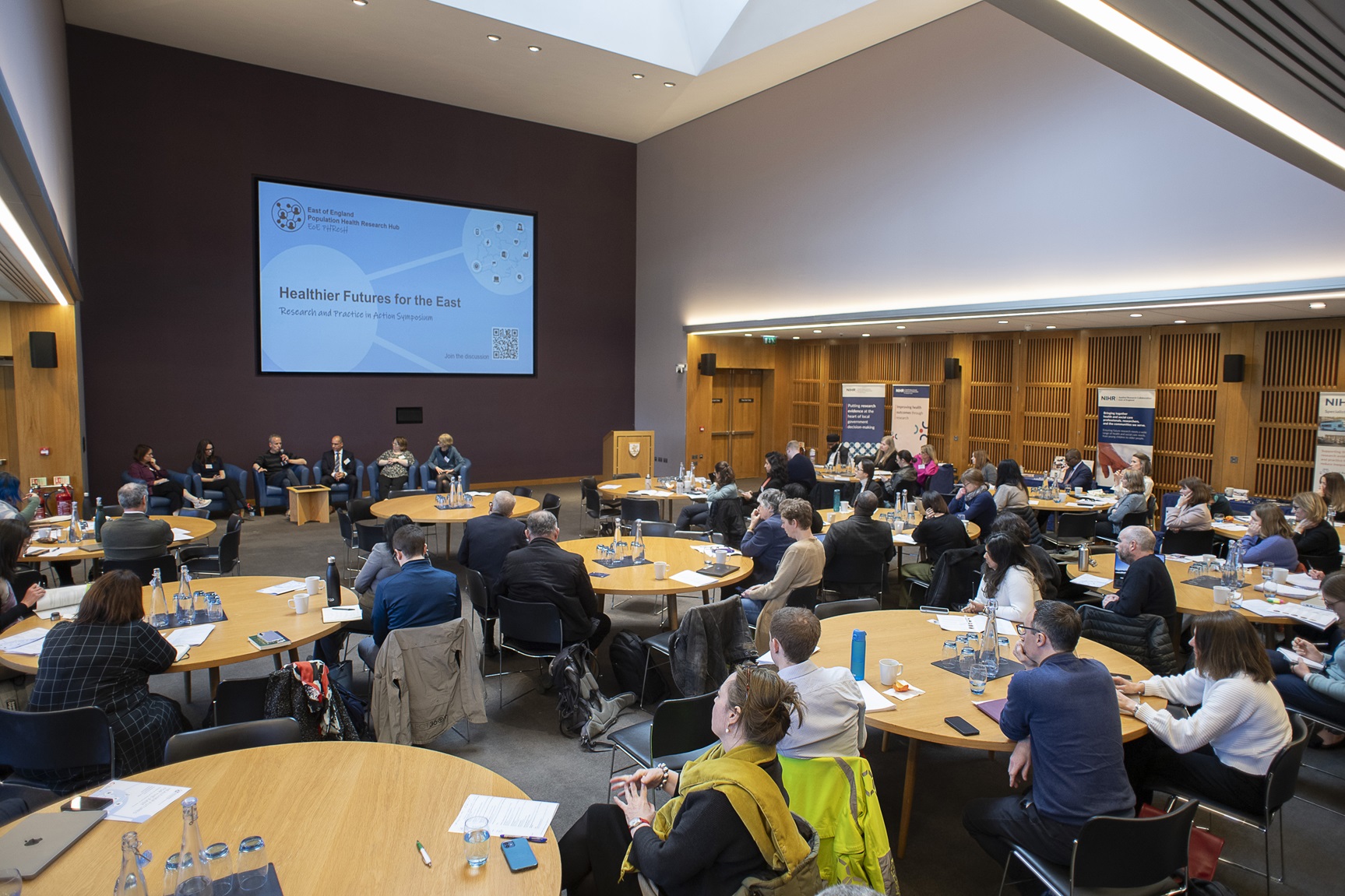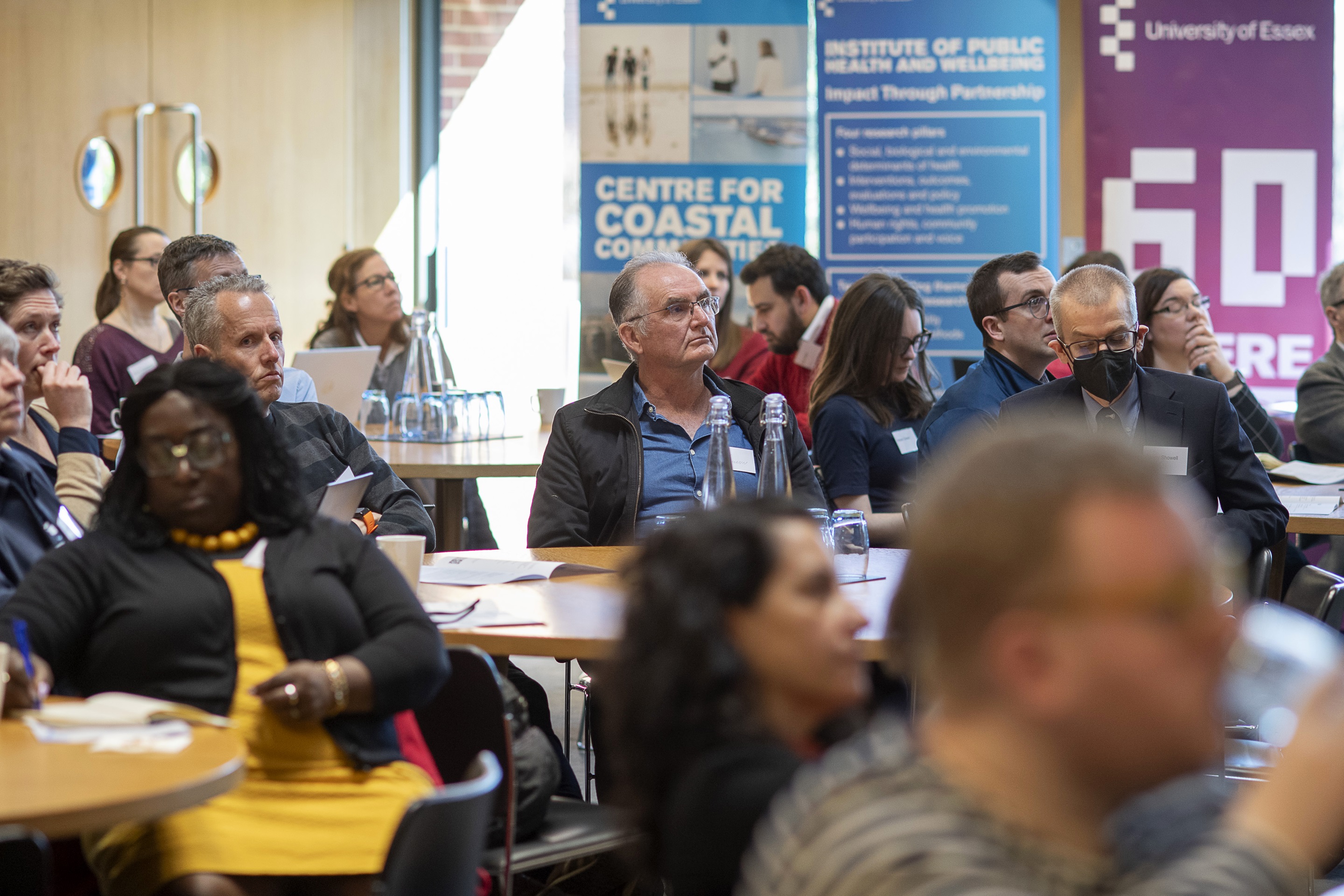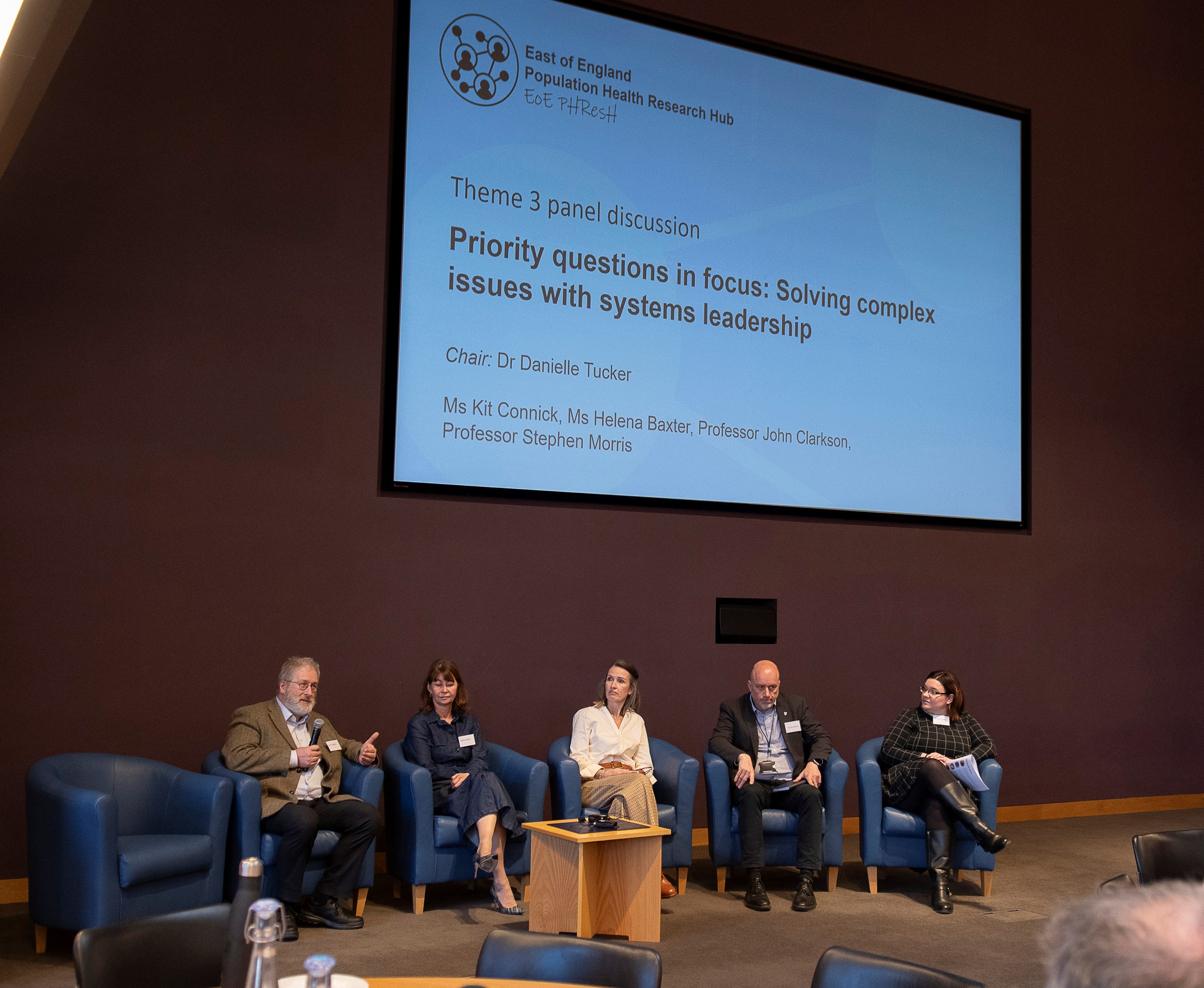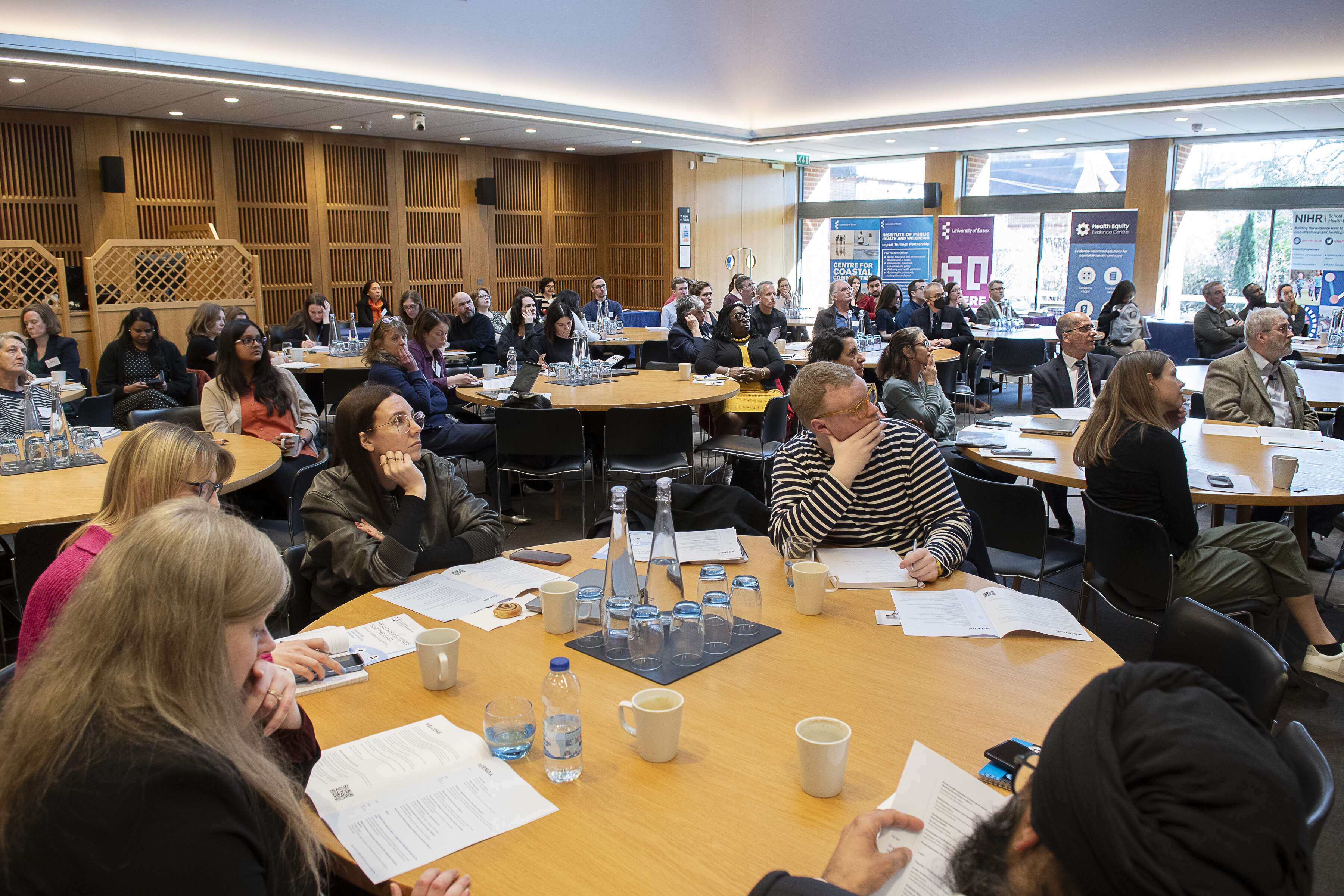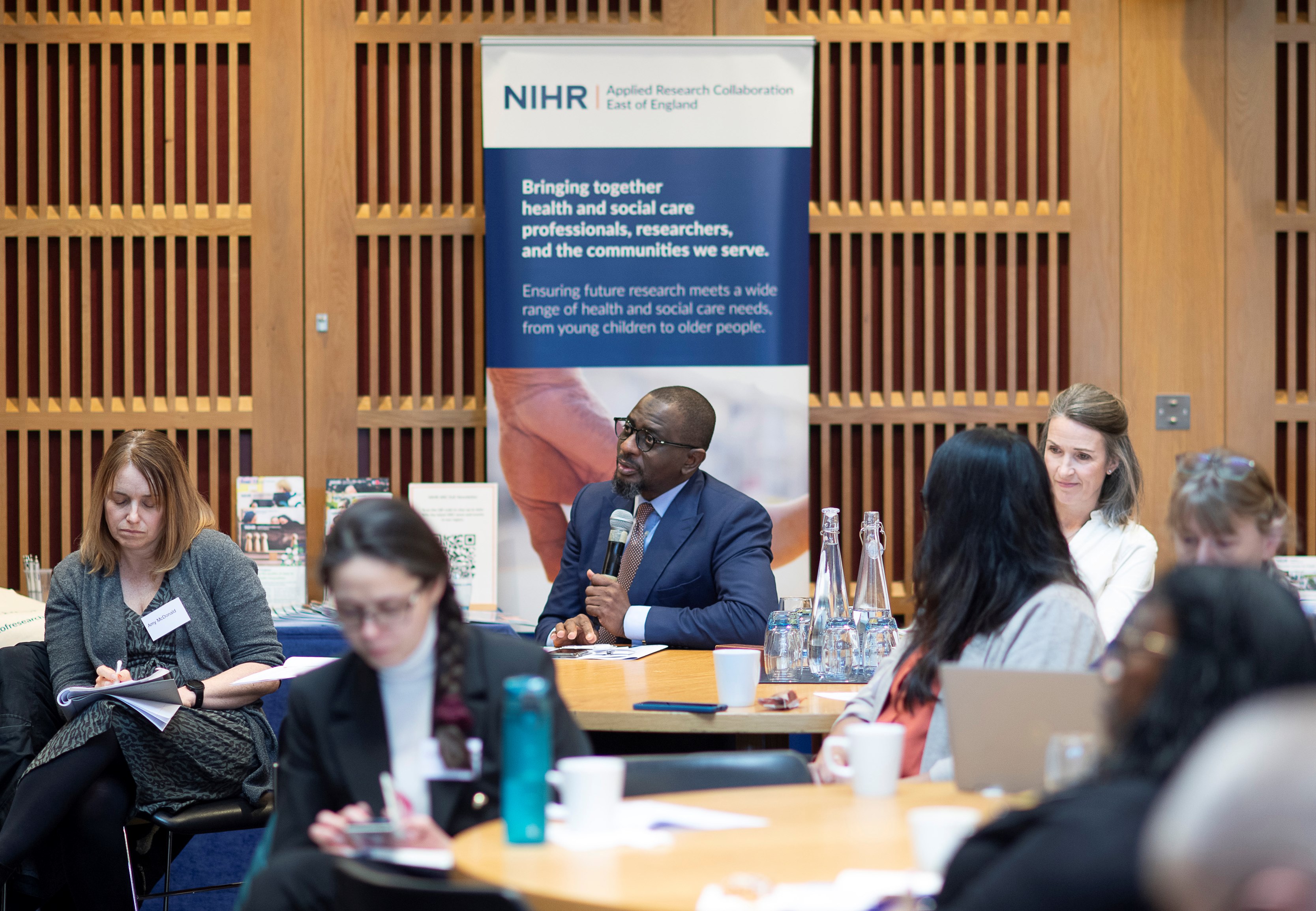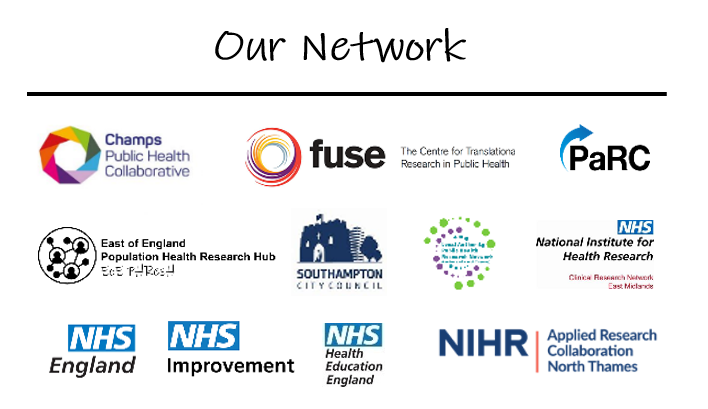PHResH has been instrumental in driving regional public health research and practice through various initiatives. Here are some key stories highlighting our efforts and achievements:
In March 2025, the East of England Population Health Research Hub, with support from The Health Foundation and the Office of Health Improvement and Disparities, hosted a symposium bringing together public health leaders, academics, local authority practitioners, NHS and Integrated Care Board representatives, and funders from across the region. We came together to explore how systems leadership, stronger partnerships, and use of evidence, could help us build a healthier future for everyone in the East of England. A detailed symposium report can be found here.
Why This Matters
The East of England has its own set of health challenges: an ageing and diverse population, high levels of preventable long-term conditions, and stark inequalities in health outcomes. Yet, the region also holds world-class academic institutions and a committed public health workforce. The symposium created space to reflect on progress and explore collaborative pathways toward a healthier, fairer future.
“The Symposium was more than a meeting—it was the start of building relationships and trust in a complex system.”
Professor Mariachiara Di Cesare
Steering Committee Member
East of England Population Health Research Hub
Key Themes That Emerged
1. Connecting the Dots: From Silos to Systems
The region’s health and care systems need to evolve from fragmented efforts to coordinated, whole-system approaches. Better integration of services and shared responsibility for population health can reduce strain on the system and improve outcomes. This includes bridging clinical care with the broader determinants of health, such as housing, employment, and community wellbeing.
2. Rethinking Evaluation: Towards a Culture of Continuous Improvement
Despite strong enthusiasm for using evidence to guide decisions, several barriers persist. With limited time, resources, and capacity, evaluation can feel like a ‘nice to have’ rather than a must-do. Evaluation is often viewed as a form of performance appraisal. Shifting this mindset is essential to move from project-based outcome measurement to a culture of continuous learning.
Key suggestions included:
- Investing in workforce skills and confidence around evaluation
- Embedding evaluation into everyday practice—not just for compliance, but for improvement
- Framing evaluation as a collaborative tool for learning, not just performance monitoring
3. Making Research Matter
There’s no shortage of research in our region—but how often does it actually shape the decisions we make on the ground? Symposium discussions underscored the need to:
- Make insights timely and locally relevant
- Let local demand shape research priorities
- More adaptive planning through real-time data and analytics
4. Funding and Collaboration: A Call for Sustainable Infrastructure
There was a strong call for long-term investment in collaborative research and evaluation. This includes:
- Collaborative funding models between local authorities, NHS bodies, and academic institutions
- Coordination between organisations to avoid duplication and align values
- Designing projects with clear pathways to scale, not just pilots
5. Systems Leadership for Complex Challenges
Many challenges—like hospital discharge delays or undiagnosed hypertension—highlight the need for leadership that sees the bigger picture. Optimising services in isolation won’t work. Instead, there is a need for shared accountability and leadership across boundaries.
Opportunities discussed included:
- Leadership training using national and international frameworks
- Leveraging the New Hospital Programme to redesign services around prevention and integration
- Embedding mental health more fully into care pathways
- Co-designing AI and digital innovation with frontline staff
Spotlight: Hypertension as a Model
One success story shared was the region’s work tackling hypertension. Through strong leadership, local collaboration, and smart use of data tools, progress has been made—but over 150,000 cases still go undiagnosed. It’s a reminder that we still need to invest in the right tools, equity, and local capacity to keep making progress.
What’s Next: From Thinking to Doing
The symposium ended with a collective commitment to act. There is a shared ambition to launch two new initiatives:
- Think Tank: A strategic group to guide leadership development and systems thinking
- Do Tank: A practical space to test ideas, pilot solutions, and drive peer learning in real-world settings
Together, these groups will help keep the region moving forward with a joined up approach to health and care.
Recommendations Moving Forward
- Choose a Shared Health Priority
Focus collective energy on a few clearly defined regional health issues—such as healthy ageing, mental wellbeing, or cardiovascular health. Establish a transparent process for selecting this priority, ensuring it reflects both population needs and system-wide capacity for action. - Build a Continuous Learning Ecosystem
Equip the workforce with skills to reflect, learn, and improve in a structured approach. - Strengthen Knowledge Mobilisation
Improve the flow of evidence into practice by connecting the right people in a timely way, exploring digital platforms to connect practitioners with experts and resources. - Foster Collaboration Through Systems Thinking
Promote cross-sector partnerships that co-design and scale sustainable solutions—backed by fellowships, secondments, and long term funding. - Shared Mission for Health Equity
A region-wide commitment to tackling health inequalities, to be achieved through strong partnerships, collective actions, and a commitment to learning and collaboration to move beyond isolated initiative.
“It’s an ecosystem. The interdependencies are more than just each organisation doing it on its own…. What can we do together?”
Professor Aliko Ahmed
Regional Director of Public Health for East of England ( NHS & OHID)
Collecting and using community insights helps local authorities make informed, impactful decisions. Following ethical standards and accountability guidelines ensures this process respects community values, protects personal information, and builds trust. This simple checklist is developed to help you plan and reflect on your data collection journey. It is neither exhaustive or definitive. Instead, it highlights common issues encountered during data collection and directs you to key resources to support you in embarking on an ethical and responsible journey.
In the 2016 Academy of Medical Sciences report "Health of the Public 2040," there was a call for regional public health service and academic interfaces to facilitate better evidence for decision-making. Responding to this, PHResH convened the Public Health Engagement in Research National Network (PHERN) in December 2022. This network connects regional and local hubs of engagement between public health researchers and practitioners. PHResH has taken a lead role in developing this national network to share experiences, support emerging hubs, document challenges and solutions, and foster sustainable regional networks. Currently, the PHERN network comprises 8 regional hubs across the country
You are most welcome to learn more about the experience and learning involved in the formation of some of the Regional Hubs:
Presentation on the Reflection and Experience from the Northeast Region: The Centre for Translational Research in Public Health (fuse)
Presentation on the Experience and Learning from the Yorkshire and Humber Region: Practice and Research Collaborative (PaRC)
Presentation from London/North Thames Region: London Local Authority Public Health Research Network
Northwest Region: Champs Public Health Collaborative
Strategic Skill Enhancement: Empowering Stakeholders through the Hub of Engagement Workshop
On 7 November 2022, PHResH hosted a Hub of Engagement workshop aimed at fostering networking and strategic planning among regional public health hubs. The workshop successfully engaged key stakeholders, providing comprehensive skills training in strategic thinking and planning at the system level, using tools like stakeholder mapping and improvement systems canvases. The session was led by Professor John Clarkson, a systems engineer and co-Director of the University of Cambridge’s Public Health Interdisciplinary Centre. This initiative underscores PHResH's commitment to enhancing collaboration and strategic planning among regional hubs, thereby strengthening public health efforts at the national level.
Integrating Efforts through Infrastructure Development
PHResH has taken the lead in co-developing infrastructure and processes to engage regional hubs, facilitating regular meetings to promote networking, knowledge sharing, mutual support, and collaboration. By initiating a rotation chair and presentation system, PHERN meetings provide opportunities for resource sharing and knowledge exchange. Members can draw upon the group’s expertise to gain practical know-how, such as enhancing engagement with public health services, setting priorities, and overcoming barriers. The network also supports new hubs by providing skills, pathways, feedback, and advice. With active support from PHResH, network members are developing business cases, mapping key resources and networks, and exploring funding and collaboration opportunities to enhance sustainability and impact.
Enhancing Investment with Networking Platforms
The Network envisions deepening the impact of its members through an integrated and collective approach. It aims to create a robust, evidence-informed mechanism to reduce duplication, promote best practices, capitalize on collaborative funding opportunities, benefit from broader generalization of outputs, raise the collective profile, and advocate for national policy.
PHResH has significantly contributed to enhancing regional public health research through co-designed funding bids over the years:
Enhancing Ethics Approvals for Local Authorities-based Research
In early 2022, PHResH identified the need for improved ethics approvals for local authority (LA)-based research. Collaborating with NIHR Research Design Service (RDS) and Local Authorities, we assessed ethics needs in public health research. PHResH also advocated for an LA-based Public Health Consultant within the NIHR Research Support Service Public Health Specialty Centre Application.
Key Outcomes: Our efforts influenced the inclusion of ethics considerations in NIHR funding calls and strengthened research infrastructure at the LA level.
Supporting Greater Essex NIHR HDRC Application
In 2023, PHResH supported the Greater Essex NIHR HDRC application by leveraging research expertise, facilitating communication and dissemination, and providing training for local authorities.
Key Outcomes: Our support contributed to securing £5,000,000 funding (2023-28) for Greater Essex, enhancing research capability within local authorities and improving the quality and impact of public health research.
Supporting Cambridge Public Health in Addressing Intergenerational Public Health Adversity
Also in 2023, PHResH aided Cambridge Public Health (CPH) in securing funding for “Working Together: Breaking Intergenerational Cycles of Public Health Adversity.” This project focuses on evidence-based interdisciplinary actions to enhance childhood mental health and address intergenerational public health challenges.
Key Outcomes: Our efforts facilitated the securing of £9,907 from the University of Cambridge IRC/SRI Impact and Knowledge Exchange Small Grant. This funding supports a CPH Implementation Fellow and a Policy Workshop, fostering knowledge exchange and implementation of key public health policies involving policymakers, experts, and stakeholders.
In response to the Levelling Up agenda, both national and local ambitions aim to improve Healthy Life Expectancy (HLE) by 5 years by 2035. This highlights the need for evidence-based policymaking and effective practices. To develop regional public health strategies, PHResH co-organised a policy workshop with the Centre for Science and Policy, University of Cambridge, on 24 April 2023. The workshop brought together policymakers, academic researchers, and experts to identify HLE determinants and policy interventions in the East of England. Details of the Policy Workshop can be found here.
Insights from East of England
Participants discussed factors influencing HLE, stressing the importance of environmental and systemic changes to reduce inequalities and improve health determinants. Specific interventions identified included early management of ill health and hypertension, reducing unhealthy food advertising in deprived areas, implementing low traffic neighbourhoods, enhancing school environments, and investing in lifelong learning. They also noted barriers such as the need for better cross-sector collaboration and concerns about centralisation of powers.
National Policy Perspectives
On a national level, the discussion highlighted how policy changes can support HLE improvement. Key areas included empowering local authorities to shape health-promoting environments, redirecting funding for prevention and social care, improving housing quality, and using policy instruments to promote healthy behaviours. Effective implementation requires coordination among stakeholders, inclusive health approaches, focusing on interventions for working-age adults, enhancing regional evaluation capacity, and turning data into usable evidence.
From Vision to Action
To turn these initiatives into actions, a working group of policymakers and academics has been formed. They are identifying evidence gaps, aligning regional priorities, and showcasing how specific interventions can improve HLE. At a meeting on 13 May 2024, Prof. Max Bachmann from the University of East Anglia presented collaboration efforts with the local council to understand HLE changes over the past two decades. This provided valuable data for targeted policies to improve HLE and reduce inequality, generating interest from local authorities for further collaboration. Successful strategies and lessons learned will be shared to enhance impacts across different regions.
The PHResH Evaluation Working Group, comprising academics and service colleagues across the region, provides practical support for practitioners to enhance their skills in evaluating public health interventions. Since November 2021, we have hosted over 10 webinar sessions on topics ranging from basic evaluation methods to addressing health inequalities, attracting over 570 participants from local government, integrated care systems, and academic institutions across the East of England.
Key Impacts:
- Enhancing Public Health Interventions: Webinars offer evidence-based methodologies for evaluating public health initiatives, helping attendees identify effective strategies, allocate resources efficiently, and prioritize high-impact projects.
- Tailoring Interventions to Regional Needs: The series provides local authorities with regional expertise and practical insights on topics like evaluating multi-stakeholder programs, conducting focus groups, and co-producing findings. Workshops emphasized inclusivity of under-heard experts and service users and focused on evaluating population health approaches targeting local health disparities. By addressing these challenges and fostering collaboration, the webinars equipped participants with the tools and knowledge to drive positive change in their communities.Public health professionals also benefit from personalized support through “Drop-in Clinics.” In these sessions, individuals meet with PHResH evaluation chair, Professor Andy Jones, to receive tailored guidance for their evaluation programs.
“I found our conversation very useful, informing many elements of our social value strategy, particularly the content of the short social value understanding survey.”
Drop-in-clinic participant
- Building Regional Public Health Capacity: The webinars promote continuous learning and capacity building within public health organizations. By upskilling colleagues in evaluation methods, the series has supported them in designing, implementing, and evaluating interventions effectively. Examples include two regional evaluation projects that arose from PHResH relationships: one focusing on whole-school approaches to mental health support and another on the timing of needs assessment in very young children.
All webinar recordings are available online to support colleagues with their evaluations. Additionally, colleagues are encouraged to explore various resources to enhance and champion their own evaluation programs.

